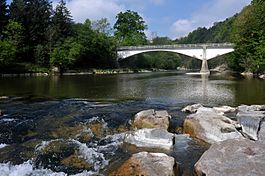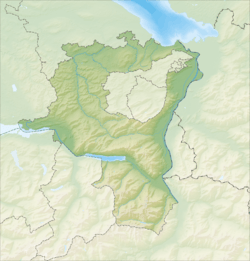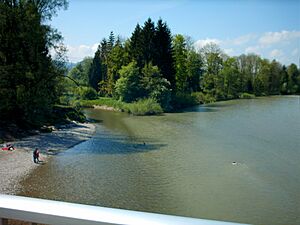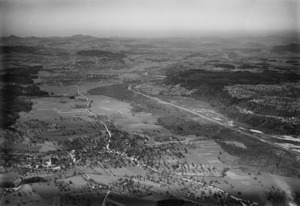Oberbüren facts for kids
Quick facts for kids
Oberbüren
|
||
|---|---|---|
 |
||
|
||
| Country | Switzerland | |
| Canton | St. Gallen | |
| District | Wil | |
| Area | ||
| • Total | 17.73 km2 (6.85 sq mi) | |
| Elevation | 500 m (1,600 ft) | |
| Population
(Dec 2020 )
|
||
| • Total | 4,576 | |
| • Density | 258.09/km2 (668.46/sq mi) | |
| Postal code |
9245
|
|
| Surrounded by | Flawil, Gossau, Niederbüren, Niederhelfenschwil, Oberuzwil, Uzwil, Zuzwil | |
Oberbüren is a town, also known as a municipality, located in the canton of St. Gallen in Switzerland. It is part of the Wil Wahlkreis, which is like a special district or constituency.
Contents
History of Oberbüren
Oberbüren is a town with a long history! It was first mentioned in official records way back in the year 817. Back then, it was called ad Purias.
Geography of Oberbüren
Oberbüren covers an area of about 17.8 square kilometers (about 6.87 square miles). A large part of this land, about 65.8%, is used for farming. Forests cover about 20.3% of the area.
About 12% of the land is developed with buildings and roads. The remaining small part (1.9%) includes natural features like rivers and lakes.
The town is situated in the Wil district, right along the Glatt and Thur rivers. Oberbüren includes the main village of Oberbüren, plus the smaller villages of Niederwil and Durstudlen.
Coat of Arms
The coat of arms for Oberbüren is quite unique! It shows a red stag (male deer) skull and antlers on a silver (or white) background. This symbol helps represent the town.
People and Population
Oberbüren has a population of about 4,000 people. Around 9.4% of the people living here are from other countries. Many of these foreign residents come from places like former Yugoslavia, Italy, Germany, and Turkey.
Most people in Oberbüren, about 92.5%, speak German. Other languages spoken include Serbo-Croatian and Albanian.
Age Groups in Oberbüren
Let's look at the different age groups in Oberbüren:
- About 15.3% of the population are children aged 0 to 9 years old.
- Another 15.0% are teenagers between 10 and 19 years old.
- Young adults, aged 20 to 29, make up about 12.8% of the population.
- Adults aged 30 to 39 are the largest group, at 18.9%.
- People aged 40 to 49 make up 13.7%, and those 50 to 59 are 11.5%.
- Senior citizens (60 and older) make up about 12.8% of the population.
Households and Families
In Oberbüren, about 7.7% of people live alone. Many people, about 63.6%, live in families with children. About 19.5% are couples without children. There are also single-parent homes and other types of living situations.
Politics and Elections
In the 2007 federal election, the most popular political party in Oberbüren was the SVP. They received almost half of the votes (47.4%). Other popular parties included the CVP, the FDP, and the SP.
Education in Oberbüren
Education is important in Oberbüren. About 72.8% of adults aged 25-64 have completed either high school or gone on to higher education, like university.
Here's a look at the highest education levels completed by people in Oberbüren:
- 19.2% finished primary school.
- 39.6% completed secondary education (like high school).
- 8.4% went on to tertiary education (like college or university).
Historical Population Growth
The population of Oberbüren has grown quite a bit over the years:
| year | population |
|---|---|
| 1850 | 1,597 |
| 1900 | 1,753 |
| 1950 | 1,977 |
| 2000 | 3,946 |
Economy and Jobs
Oberbüren has a healthy economy. In 2007, the unemployment rate was quite low, at 1.43%.
People in Oberbüren work in different types of jobs:
- The primary sector involves jobs like farming and forestry. About 240 people work in this sector.
- The secondary sector includes manufacturing and construction. About 812 people work in these types of jobs.
- The tertiary sector is the largest, with jobs in services like shops, offices, and healthcare. About 1,214 people work in this sector.
Many people who live in Oberbüren also work in other towns. At the same time, many people from other towns come to Oberbüren for work.
Religion in Oberbüren
In Oberbüren, people follow various religions:
- About 59.2% of the population are Roman Catholic.
- About 21.1% belong to the Swiss Reformed Church (a Protestant church).
- Smaller groups include people who belong to the Orthodox Church (2.15%) and other Christian churches (2.43%).
- About 6.69% of the population are Islamic.
- Around 4.84% of people do not belong to any church, or are agnostic or atheist.
See also
 In Spanish: Oberbüren para niños
In Spanish: Oberbüren para niños






